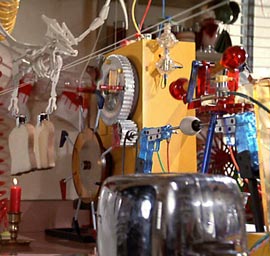Peak Technology
Every few years, we break through another technological barrier previously thought to be unbreakable. New markets are created and new players fill those markets, letting the technology market advance quickly with high competition, sophisticated products, and low prices.
But it's easy to look at some markets and think, "This is as good as it's going to get." They've hit Peak Technology. Is this just the inability to see beyond the current barrier?
When a certain type of product stops significantly improving for a while, it has probably hit at least one fundamental limit:
- Technological limits: We don't know how to improve this.
- Physical limits: We can't improve this.
- Cost limits: If we improved this, it would be too expensive.
- Demand limits: Nobody wants or needs this to be improved.

A significant breakthrough in any particular limit can affect the others. For example, the discovery of new materials or manufacturing techniques can shatter our previous notion of physical limits, which can lead to completely new technologies that can be made so cheaply and improve the product by such a magnitude that new demand is born.
But magnitude is different from incremental changes. Most people won't notice if a new advance is 10% better than the status quo. But make it 10 times better, and the entire market shifts.
Recorded-music players have had an exciting history. 8-tracks were much smaller and more durable than LPs, so people could finally put players in cars. Cassettes were even smaller, more durable, and with longer capacity than 8-tracks, so people could finally put players in their purse or a large jacket pocket. CDs didn't break any new ground for size, but hugely improved sound quality and features, allowing people to easily and instantly skip between songs or shuffle them randomly, and eventually enabling people to store, play, and trade entire music collections with their computers.
After a few failed competitors broke into the market and jumped on the legal grenades, Apple released the iPod. Now, people can carry their entire music collections in a small pants pocket wherever they go, with fast and easy access to anything they want to hear.
Have we hit Peak Fidelity? What can audio players do to improve?
- Reduce size: Players can't be much smaller than the iPod Nano unless they sacrifice their interface. Even the Nano is often criticized because the touchwheel is too small for large hands to operate. And if you remove the screen to save space, the interface suffers dramatically. Plus, since the Nano is dramatically smaller than the average wallet or phone, it will already travel comfortably with almost any clothing and season. (demand limit, physical limit)
- Increase capacity: Even the 1 GB iPod Nano is enough to store the amount of music that 75% of people actually have. If the next generation magically got 10 times larger, it would hardly affect anyone. (demand limit)
- Increase sound quality: Sound quality has extremely diminishing returns, and we've already achieved such excellent quality that most people don't have speakers or headphones (or ears?) of sufficient quality to hear any possible improvement. (demand limit)
- Increase battery life: Maybe, but very few people use their iPods for more than 10 hours per day without plugging it in, when they're likely to start seeing battery life problems. With current battery technology, which moves very slowly, batteries are limited mainly by the amount of space manufacturers are willing to give them: improving the iPod's battery life would make it larger and heavier. (demand limit, minor technological limit)
- Add features: There's some minor room for improvement here, but I'm certainly not getting my hopes up for the video non-revolution. Most other feature additions would be minor and wouldn't be widely noticed. Some, like satellite radio tuning or wireless music sharing, would never get past the record labels' lawyers. (demand limit)
Some demand limits can shift, of course. In the mid-1990s, when everyone had portable CD players, nobody ever considered the possibility of carrying their entire music collection with them. (Well, they used these horrible things.) Demand shifted when the first iPods came out and people realized that there was the potential to have everything with you all the time within a reasonable size and weight.
This is an easy example to discuss because there aren't many factors. What about computers in general? We're very far from Peak Technology, but I'm not convinced that general-purpose computers are immune to it.
But portable audio players probably don't have a future of explosive growth. Have we truly hit Peak Fidelity, or will some future technology dramatically improve portable music players in a way that average people care about?